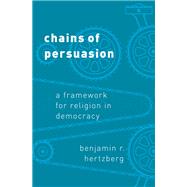Chains of Persuasion A Framework for Religion in Democracy
, by Hertzberg, Benjamin R.- ISBN: 9780190883041 | 0190883049
- Cover: Hardcover
- Copyright: 12/26/2018
Democratic politics seems to inspire religious conflict - politicians consistently use religious differences for political gain, while religious nationalism and nationalistic reactions to religious diversity are on the rise in much of the world. And yet predominant theoretical accounts of liberal democracy provide citizens precious little applicable guidance in making judgments about religion's proper role in their political societies.
Chains of Persuasion provides a new moral framework to guide citizens' evaluations of religious politics. Rejecting claims that religion must be relegated to the private sphere or that all attempts to evaluate its political roles are oppressive, Benjamin Hertzberg argues that democratic ideals are robust enough to assess the full range of ways religion influences democratic political life.
Hertzberg's analysis draws on critical theories of religion, philosophical debates about public reason, deliberative and instrumental justifications of democracy, and democratic virtue theory. He argues that citizens must recognize that democracy is a way-of-life, with crucial implications for civic society beyond formal political institutions, in order to attend to the ways in which religion can both enhance and undermine democracy.
He applies this framework by criticizing American public discussions of two prominent religious minorities: Mormons and Muslims. If citizens are to make judgments consistent with democratic norms, they must pay more attention to the nature of religions' authority claims instead of merely evaluating the values religions proclaim.
Chains of Persuasion provides a new moral framework to guide citizens' evaluations of religious politics. Rejecting claims that religion must be relegated to the private sphere or that all attempts to evaluate its political roles are oppressive, Benjamin Hertzberg argues that democratic ideals are robust enough to assess the full range of ways religion influences democratic political life.
Hertzberg's analysis draws on critical theories of religion, philosophical debates about public reason, deliberative and instrumental justifications of democracy, and democratic virtue theory. He argues that citizens must recognize that democracy is a way-of-life, with crucial implications for civic society beyond formal political institutions, in order to attend to the ways in which religion can both enhance and undermine democracy.
He applies this framework by criticizing American public discussions of two prominent religious minorities: Mormons and Muslims. If citizens are to make judgments consistent with democratic norms, they must pay more attention to the nature of religions' authority claims instead of merely evaluating the values religions proclaim.







